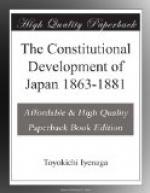“ECHIZEN SAISHO,
Tosa SAKIO no SHOSHO,
NAGATO SHOSHO,
Satsuma SHOSHO,
Aki SHOSHO,
HOSO Kawa Ukio DAIBU.”
The advice of these notables was well received. A formal invitation to an audience with the Emperor was extended to the foreign ambassadors. They soon accepted the invitation. Their appearance in the old anti-foreign city of Kioto, before the personage who was considered by the masses as divine, was significant. It put an end to the all-absorbing, all-perplexing theme of the day. The question of foreign policy was settled.
The next act of the statesmen of the Restoration was to sweep away the abuses of the court, and to establish the basis of a firm internal administration. The most effectual means of accomplishing this, it seemed to the sagacious statesmen, was to move the court from the place where those abuses had their roots. Ichizo Okubo,[6] a guiding spirit of the Restoration, presented the following memorial to the Emperor:
“The most pressing of your Majesty’s pressing duties at the present moment is not to look at the empire alone and judge carelessly by appearances, but to consider carefully the actual state of the whole world; to reform the inveterate and slothful habits induced during several hundred years, and to give union to the nation....
“Hitherto the person whom we designate the sovereign has lived behind a screen, and, as if he were different from other human beings, has not been seen by more than a very limited number of Kuge; and as his heaven-conferred office of father to his people has been thereby unfulfilled, it is necessary that his office should be ascertained in accordance with this fundamental principle, and then the laws governing internal affairs may be established....
“In the present period of reformation and restoration of the government to its ancient monarchical form, the way to carry out the resolution of imitating the example of Japanese sages, and of surpassing the excellent governments of foreign nations, is to change the site of the capital....
“Osako is the fittest place for the capital ... For the conduct of foreign relations, for enriching the country and strengthening its military power, for adopting successful means of offense and defense, for establishing an army and navy, the place is peculiarly fitted by its position ... I most humbly pray your Majesty to open your eyes and make this reform....




